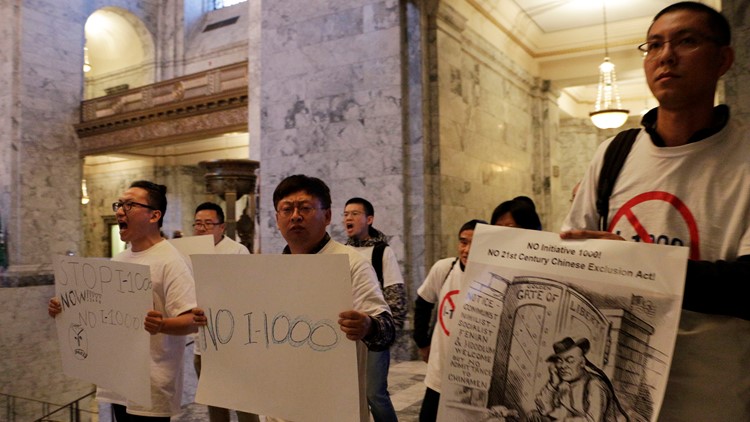Editor's note: The above video is from a 2018 campaign to repeal the ban of affirmative action.
Opponents of an effort to restore affirmative action in Washington state said Wednesday they have gathered enough signatures to force a popular vote on a measure that was approved by the Legislature earlier this year.
The opponents of Initiative 1000, which passed the Legislature on the final day of the session in April, had just 90 days to gather 129,811 valid signatures to force a vote onto the ballot in November.
The Referendum 88 campaign — which has raised more than $690,000 since May — turned in nearly 177,000 signatures and say they will file roughly 20,000 more before a Saturday deadline.
Deputy Secretary of State Sheri Nelson said it will take up to two weeks to scan the petition sheets and determine if there are enough valid signatures to qualify for the ballot.
Affirmative action has been illegal in Washington since Initiative 200 was approved by voters in 1998.
I-1000 would prohibit using factors such as race as the sole qualifier for an otherwise less-qualified applicant, and also ban mandatory quotas.
Instead, it permits state agencies to establish diversity goals and timelines, and consider being part of a minority group as a contributing factor for an applicant.
Along with race, the measure allows consideration of sex, ethnicity, age, disability and honorable discharge or military status.
I-1000 was set to take effect on Sunday but is now on hold pending the examination of signatures and possible referendum vote.
Supporters of the referendum say the public should be allowed to have a say when lawmakers make changes to voter-approved laws. They also argue that creating additional or special opportunities or assistance for one group creates even more inequality.
"It's not a Republican or Democrat issue, it's an American issue," said Linda Yang, with the 'Let People Vote' campaign. "I think Americans support individual merit-based achievement."
Advocates of I-1000 have argued that the proposal is a way to create opportunities for groups that, especially because of historical discrimination, end up under-represented in education and employment.
"I believe that talent is universal, opportunity is not," said state Sen. Joe Nguyen, who voted for the measure in the Senate and will be part of campaign in support of I-1000. "Nothing in this initiative gives anyone anything for free. You still have to be qualified and you still have to be competent. This just means you give people a chance."
Gov. Jay Inslee today issued the following statement on the referendum effort:
“The Legislature’s approval of I-1000 signaled an important commitment to dismantling the systemic barriers that keep many Washingtonians from having equal access to educational and economic opportunities. Our agencies have begun initial preparation to implement the new law, and are prepared to launch this work if and when the law is allowed to go into effect. We are awaiting the verified count from the Secretary of State before taking any additional action.”



